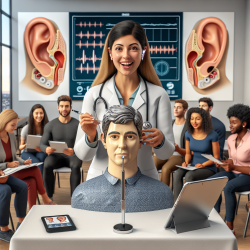Introduction
Creatine transporter deficiency, a rare genetic disorder, is gaining attention for its profound impact on neurodevelopmental outcomes, particularly in speech and language. This condition, caused by mutations in the SLC6A8 gene, disrupts the transport of creatine to the brain, leading to intellectual disabilities and speech apraxia among other challenges. For practitioners in the field of speech-language pathology, understanding the nuances of this condition can be pivotal in crafting effective intervention strategies.
The Science Behind the Deficiency
The study titled Creatine transporter deficiency: Novel mutations and functional studies provides a comprehensive look at the genetic mutations associated with this disorder. It highlights the discovery of novel mutations and their functional impacts, offering a deeper understanding of how these genetic changes manifest in clinical symptoms.
Key findings from the study include:
- Identification of novel mutations in the SLC6A8 gene that impair creatine transport.
- Functional studies demonstrating reduced creatine uptake in fibroblasts from affected individuals.
- Clinical presentations that include global developmental delays and language apraxia.
Implications for Therapy
For speech-language pathologists, these findings underscore the importance of early and accurate diagnosis. Children with creatine transporter deficiency often present with significant speech and language challenges, making targeted interventions crucial. Understanding the genetic underpinnings can inform more personalized therapy plans, potentially incorporating dietary adjustments or creatine supplementation as adjuncts to traditional speech therapy.
Moreover, the study's findings can inspire practitioners to advocate for genetic testing in cases of unexplained developmental delays, ensuring that underlying metabolic disorders are not overlooked.
Encouraging Further Research
While the current study provides valuable insights, it also opens the door for further research. Practitioners are encouraged to contribute to this growing body of knowledge by documenting clinical outcomes and sharing case studies. Collaborative efforts between clinicians and researchers can accelerate the development of effective treatment protocols and improve quality of life for affected individuals.
Conclusion
Understanding creatine transporter deficiency is more than an academic exercise; it's a pathway to better therapeutic outcomes. By integrating the latest research findings into practice, speech-language pathologists can make informed decisions that enhance the developmental trajectories of children in their care.
To read the original research paper, please follow this link: Creatine transporter deficiency: Novel mutations and functional studies.










